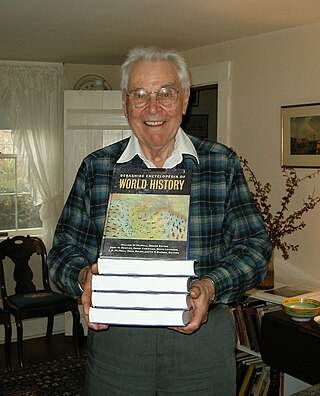Related Research Articles

Macroeconomics is a branch of economics that deals with the performance, structure, behavior, and decision-making of an economy as a whole. This includes national, regional, and global economies. Macroeconomists study topics such as output/GDP and national income, unemployment, price indices and inflation, consumption, saving, investment, energy, international trade, and international finance.

Oswald Arnold Gottfried Spengler was a German polymath whose areas of interest included history, philosophy, mathematics, science, and art, as well as their relation to his organic theory of history. He is best known for his two-volume work The Decline of the West, published in 1918 and 1922, covering human history. Spengler's model of history postulates that human cultures and civilizations are akin to biological entities, each with a limited, predictable, and deterministic lifespan.
World history or global history as a field of historical study examines history from a global perspective. It emerged centuries ago; leading practitioners have included Voltaire (1694–1778), Hegel (1770–1831), Karl Marx (1818–1883), Oswald Spengler (1880–1936), and Arnold J. Toynbee (1889–1975). The field became much more active in the late 20th century.

Economic history is the study of history using methodological tools from economics or with a special attention to economic phenomena. Research is conducted using a combination of historical methods, statistical methods and the application of economic theory to historical situations and institutions. The field can encompass a wide variety of topics, including equality, finance, technology, labour, and business. It emphasizes historicizing the economy itself, analyzing it as a dynamic entity and attempting to provide insights into the way it is structured and conceived.

Economic growth can be defined as the increase or improvement in the inflation-adjusted market value of the goods and services produced by an economy in a financial year. Statisticians conventionally measure such growth as the percent rate of increase in the real and nominal gross domestic product (GDP).

Evolutionary economics is a school of economic thought that is inspired by evolutionary biology. Although not defined by a strict set of principles and uniting various approaches, it treats economic development as a process rather than an equilibrium and emphasizes change, innovation, complex interdependencies, self-evolving systems, and limited rationality as the drivers of economic evolution. The support for the evolutionary approach to economics in recent decades seems to have initially emerged as a criticism of the mainstream neoclassical economics, but by the beginning of the 21st century it had become part of the economic mainstream itself.

A Study of History is a 12-volume universal history by the British historian Arnold J. Toynbee, published from 1934 to 1961. It received enormous popular attention but according to historian Richard J. Evans, "enjoyed only a brief vogue before disappearing into the obscurity in which it has languished." Toynbee's goal was to trace the development and decay of 19 or 21 world civilizations in the historical record, applying his model to each of these civilizations, detailing the stages through which they all pass: genesis, growth, time of troubles, universal state, and disintegration.
Philosophy of history is the philosophical study of history and its discipline. The term was coined by the French philosopher Voltaire.

The Decline of the West is a two-volume work by Oswald Spengler. The first volume, subtitled Form and Actuality, was published in the summer of 1918. The second volume, subtitled Perspectives of World History, was published in 1922. The definitive edition of both volumes was published in 1923.

Malthusianism is a theory that population growth is potentially exponential, according to the Malthusian growth model, while the growth of the food supply or other resources is linear, which eventually reduces living standards to the point of triggering a population decline. This event, called a Malthusian catastrophe has been predicted to occur if population growth outpaces agricultural production, thereby causing famine or war. According to this theory, poverty and inequality will increase as the price of assets and scarce commodities goes up due to fierce competition for these dwindling resources. This increased level of poverty eventually causes depopulation by decreasing birth rates. If asset prices keep increasing, social unrest would occur, which would likely cause a major war, revolution, or a famine. Societal collapse is an extreme but possible outcome from this process. The theory posits that such a catastrophe would force the population to "correct" back to a lower, more easily sustainable level. Malthusianism has been linked to a variety of political and social movements, but almost always refers to advocates of population control.
The overlapping generations (OLG) model is one of the dominating frameworks of analysis in the study of macroeconomic dynamics and economic growth. In contrast to the Ramsey–Cass–Koopmans neoclassical growth model in which individuals are infinitely-lived, in the OLG model individuals live a finite length of time, long enough to overlap with at least one period of another agent's life.

The Rise of the West: A History of the Human Community is a book by University of Chicago historian William H. McNeill, first published in 1963 and enlarged with a retrospective preface in 1991. It explores world history in terms of the effect different old world civilizations had on one another, and especially the deep influence of Western civilization on the rest of the world in the past 500 years. He argues that societal contact with foreign civilizations is the primary force in driving historical change. In 1964 it won the National Book Award in History and Biography.

Social cycle theories are among the earliest social theories in sociology. Unlike the theory of social evolutionism, which views the evolution of society and human history as progressing in some new, unique direction(s), sociological cycle theory argues that events and stages of society and history generally repeat themselves in cycles. Such a theory does not necessarily imply that there cannot be any social progress. In the early theory of Sima Qian and the more recent theories of long-term ("secular") political-demographic cycles as well as in the Varnic theory of P.R. Sarkar, an explicit accounting is made of social progress.

William Hardy McNeill was an American historian and author, noted for his argument that contact and exchange among civilizations is what drives human history forward, first postulated in The Rise of the West (1963). He was the Robert A. Millikan Distinguished Service Professor Emeritus of History at the University of Chicago, where he taught from 1947 until his retirement in 1987. In 1980-81 he held the George Eastman Professorship at the University of Oxford.

Oded Galor is an Israeli-American economist who is currently Herbert H. Goldberger Professor of Economics at Brown University. He is the founder of unified growth theory.
Robert Paul Brenner is an American economic historian. He is a professor emeritus of history and director of the Center for Social Theory and Comparative History at UCLA, editor of the socialist journal Against the Current, and editorial committee member of New Left Review. His research interests are early modern European history, economic, social and religious history, agrarian history, social theory/Marxism, and Tudor–Stuart England.
Unified growth theory was developed in light of the alleged failure of endogenous growth theory to capture key empirical regularities in the growth processes and their contribution to the momentous rise in inequality across nations in the past two centuries.

Demographic economics or population economics is the application of economic analysis to demography, the study of human populations, including size, growth, density, distribution, and vital statistics.

Macroeconomic theory has its origins in the study of business cycles and monetary theory. In general, early theorists believed monetary factors could not affect real factors such as real output. John Maynard Keynes attacked some of these "classical" theories and produced a general theory that described the whole economy in terms of aggregates rather than individual, microeconomic parts. Attempting to explain unemployment and recessions, he noticed the tendency for people and businesses to hoard cash and avoid investment during a recession. He argued that this invalidated the assumptions of classical economists who thought that markets always clear, leaving no surplus of goods and no willing labor left idle.

Comparative studies of the Roman and Han empires is a historical comparative research involving the roughly contemporaneous Roman Empire and the Han dynasty of early imperial China. At their peaks, both states controlled up to a half of the world population and produced political and cultural legacies that endure to the modern era; comparative studies largely focus on their similar scale at their pinnacles and on synchronism in their rise and decline.
References
- 1 2 Li, Huaiyin (2019). The Making of the Modern Chinese State: 1600–1950. Oxon: Routledge. ISBN 9781138362444.
- ↑ Matthew C. Wells, Ph.D., Parallelism: A Handbook of Social Analysis . Archived August 24, 2011.
- 1 2 Morris, Irwin; Oppenheimer, Joe; Soltan, Karol (2004). Politics from Anarchy to Democracy: Rational Choice in Political Science. Stanford, CA: Stanford University Press. p. 224. ISBN 0804745838.
- ↑ Graham, Shawn; Milligan, Ian; Weingart, Scott (2015). Exploring Big Historical Data: The Historian's Macroscope. London: Imperial College Press. p. 2. ISBN 9781783266081.
- ↑ Araujo, Ana Lucia (2017). Reparations for Slavery and the Slave Trade: A Transnational and Comparative History. London: Bloomsbury Publishing. p. 7. ISBN 9781350010598.
- ↑ Heilmann, MarkAnn; Llewellyn, Mark (2007). Metafiction and Metahistory in Contemporary Women's Writing . New York: Palgrave Macmillan. pp. 2. ISBN 9781349281855.
- ↑ Milani, Milad (2014). Sufism in the Secret History of Persia. Oxon: Routledge. p. 8. ISBN 9781844656776.
- ↑ Handbook of the Theosophical Current. Leiden: BRILL. 2013. p. 375. ISBN 9789004235960.
- ↑ Yerxa, Donald A. (2009). Recent Themes in World History and the History of the West: Historians in Conversation. University of South Carolina Press. p. 3. ISBN 978-1-57003-831-0.
- 1 2 Etkin, Nina Lilian (2009). Foods of Association: Biocultural Perspectives on Foods and Beverages that Mediate Sociability. Tucson, AZ: University of Arizona Press. p. 53. ISBN 978-0-8165-2777-9.
- ↑ Solow, Robert (May 2011). Endorsements. Princeton University Press. ISBN 9780691130026.
- ↑ Snowdon, Brian (June 2008). "Towards a Unified Theory of Economic Growth. Oded Galor on the transition from Malthusian stagnation to modern economic growth. An interview with introduction by Brian Snowdon". World Economics. 2 (9). CiteSeerX 10.1.1.724.3924 .
- ↑ Collins, Jason (2013). "Galor's Unified Growth Theory". Jason Collins Blog.
- 1 2 Ishikawa, Yoshiko (2018). "The root of economic disparity is attributed to East Africa ten thousands of years ago: Professor Oded Galor's 'Unified Growth Theory'". Wired. Vol. 31.
- ↑ "English Translation of Yoshiko Ishikawa, 'The root of economic disparity is attributed to East Africa ten thousands of years ago: Professor Oded Galor's Unified Growth Theory'". 2018.
- ↑ Galor, Oded (2011). Unified Growth Theory. Princeton: Princeton University Press. ISBN 9781400838868.